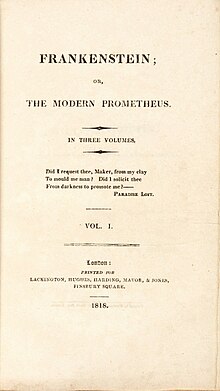
Back Frankenstein Afrikaans فرانكنشتاين Arabic ফ্ৰেংকেনষ্টাইন Assamese Frankenstein. El Prometeo modernu AST Frankenstein (suterot) AVK Frankenşteyn Azerbaijani Франкенщайн (роман) Bulgarian ফ্রাঙ্কেনস্টাইন (উপন্যাস) Bengali/Bangla Frankenstein ili moderni Prometej BS Frankenstein o el Prometeu modern Catalan
 Volume I, first edition | |
| Author | Mary Shelley |
|---|---|
| Language | English |
| Genre | Gothic novel, horror fiction, science fiction[1] |
| Set in | England, Ireland, Italy, France, Scotland, Old Swiss Confederacy, Russian Empire, Holy Roman Empire; late 18th century |
| Published | 1 January 1818 |
| Publisher | Lackington, Hughes, Harding, Mavor & Jones |
| Publication place | England |
| Pages | 280 |
| 823.7 | |
| LC Class | PR5397 .F7 |
| Preceded by | History of a Six Weeks' Tour |
| Followed by | Valperga |
| Text | Frankenstein; or, The Modern Prometheus at Wikisource |
Frankenstein; or, The Modern Prometheus is an 1818 Gothic novel written by English author Mary Shelley. Frankenstein tells the story of Victor Frankenstein, a young scientist who creates a sapient creature in an unorthodox scientific experiment. Shelley started writing the story when she was 18, and the first edition was published anonymously in London on 1 January 1818, when she was 20. Her name first appeared in the second edition, which was published in Paris in 1821.
Shelley travelled through Europe in 1815, moving along the river Rhine in Germany, and stopping in Gernsheim, 17 kilometres (11 mi) away from Frankenstein Castle, where, about a century earlier, Johann Konrad Dippel, an alchemist, had engaged in experiments.[2][3][4] She then journeyed to the region of Geneva, Switzerland, where much of the story takes place. Galvanism and occult ideas were topics of conversation for her companions, particularly for her lover and future husband Percy Bysshe Shelley.
In 1816, Mary, Percy, John Polidori, and Lord Byron had a competition to see who wrote the best horror story.[5] After thinking for days, Shelley was inspired to write Frankenstein after imagining a scientist who created life and was horrified by what he had made.[6]
Frankenstein is one of the most well-known works of English literature. Infused with elements of the Gothic novel and the Romantic movement, it has had a considerable influence on literature and on popular culture, spawning a complete genre of horror stories, films, and plays. Since the publication of the novel, the name "Frankenstein" has often been used, erroneously, to refer to the monster, rather than to his creator/father.[7][8][9]
- ^ Stableford, Brian (1995). "Frankenstein and the Origins of Science Fiction". In Seed, David (ed.). Anticipations: Essays on Early Science Fiction and its Precursors. Syracuse University Press. pp. 47–49. ISBN 978-0815626404. Retrieved 19 July 2018.
- ^ Hobbler, Dorthy and Thomas. The Monsters: Mary Shelley and the Curse of Frankenstein. Back Bay Books; 20 August 2007.
- ^ Garrett, Martin. Mary Shelley. Oxford University Press, 2002
- ^ Seymour, Miranda. Mary Shelley. Atlanta, GA: Grove Press, 2002. pp. 110–11
- ^ McGasko, Joe. "Her 'Midnight Pillow': Mary Shelley and the Creation of Frankenstein". Biography. Archived from the original on 19 February 2019. Retrieved 18 February 2019.
- ^ Shelley, Mary W. "Frankenstein: or, The Modern Prometheus". Paragraphs 11-13. Retrieved 29 December 2022 – via Project Gutenberg.
- ^ Bergen Evans, Comfortable Words, New York: Random House, 1957
- ^ Bryan Garner, A Dictionary of Modern American Usage, New York, Oxford: Oxford University Press, 1998.
- ^ Merriam-Webster's Dictionary of American English, Merriam-Webster: 2002.